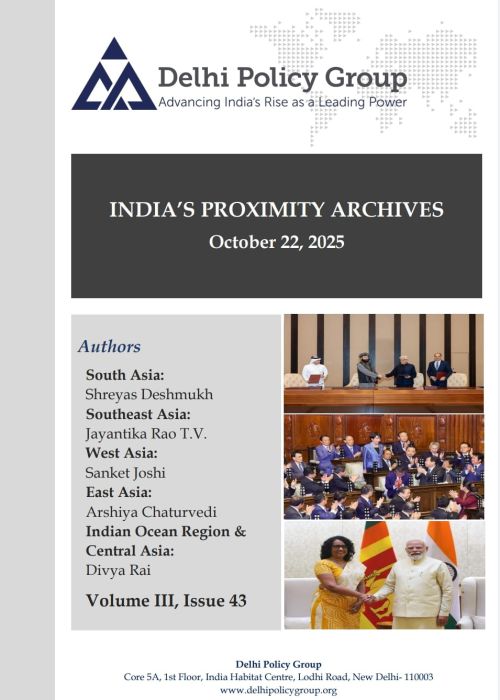India’s Proximity Archives
South Asia
Following intense border clashes and airstrikes by Pakistan on Kabul, a ceasefire agreement was signed between Pakistan and Afghanistan on October 19. Negotiations between the two countries were brokered by Qatar and Turkey, with talks being held in Doha. The Qatari Foreign Ministry announced that Pakistan and Afghanistan have agreed to future meetings to ensure the ceasefire’s endurance, confirm its execution reliably, and promote security and stability in both nations. Pakistan has sealed its border with Afghanistan, escalating pressure on Afghan merchants who depend on Pakistani maritime ports and connectivity infrastructure for transit, notably the Atari–Wagah route, which has led to the cessation of Afghanistan–India trade. Pakistan has also begun the demolition of homes belonging to Afghan refugees in various cities, claiming the reason as land encroachment.
Southeast Asia
On October 21, the Philippines’ Foreign Secretary Maria Theresa Lazaro said the Philippines hopes to advance a long-delayed code of conduct for the South China Sea when it assumes the chairmanship of the Association of Southeast Asian Nations (ASEAN) next year. She added that the Philippines remains committed to promoting a rules-based order and pursuing diplomatic dialogue amid ongoing tensions in the disputed region. Ms Lazaro acknowledged that forging a unified ASEAN stance has long been challenging, given the bloc’s diverse political, economic and strategic interests. However, she said member states share a common desire for peace and stability in the region.
East Asia
On October 21, the Japanese parliament voted in both houses to elect Sanae Takaichi as its first female Prime Minister. This signifies a transformative moment in the country’s political history where leadership positions have traditionally been dominated by men. Takaichi’s leadership, particularly her hardline approach to addressing Japan’s critical challenges, including economic troubles, the LDP’s declining popularity, and immigration concerns, will be put to the test in the months to come.
West Asia
Following a Hamas attack resulting in the deaths of two Israeli soldiers, the IDF launched a series of airstrikes targeting Hamas, which led to the deaths of 26 Palestinians on October 19. Meanwhile, US Vice President J.D. Vance arrived in Jerusalem on October 21, where he is scheduled to meet Israeli Prime Minister Benjamin Netanyahu. Vice President Vance expressed “great optimism” over the Gaza peace plan, describing it as “durable” and “going better than expected”. He reiterated President Trump's threat that Hamas would be obliterated if it refused to disarm. Hamas leaders refused to commit to any proposal calling for the disarmament of the terror group.
Central Asia
President of the Republic of Azerbaijan Ilham Aliyev arrived in Kazakhstan for a two-day state visit from October 20 to 21. Ilham Aliyev held a one-on-one meeting with Kassym-Jomart Tokayev, President of the Republic of Kazakhstan, in Astana on October 21. The two leaders held high-level bilateral talks and the second meeting of the Kazakhstan–Azerbaijan Supreme Interstate Council. The visit produced several concrete outcomes that reinforced their strategic alliance, agreements to deepen cooperation in trade, energy, transport, digital infrastructure, and industrial development, and discussions aimed at expanding freight flows along the Middle Corridor linking China, Central Asia, and Europe. A major highlight of the meeting was the announcement of the lifting of all restrictions on the transit of goods from Azerbaijan to Armenia and from third countries to Armenia through Azerbaijan. Leaders also addressed regional security and the significance of projects like the Zangezur Corridor and the U.S.-brokered TRIPP initiative. President Tokayev highlighted the importance of multifaceted cooperation and emphasised Kazakhstan’s commitment to expanding strategic partnership and trade-economic cooperation with Azerbaijan.
Indian Ocean Region
Sri Lankan Prime Minister Harini Amarasuriya undertook a three-day official visit to India from October 16 to 18, 2025—her first visit since taking office in November 2024. In New Delhi, she met Prime Minister Narendra Modi and External Affairs Minister S. Jaishankar, with discussions focusing on education, innovation, women’s empowerment, technology collaboration, fishermen’s welfare, and regional development cooperation. Prime Minister Modi reaffirmed India’s commitment to deepening bilateral partnerships and advancing shared prosperity across the region. She described India as a partner of long-standing trust and credited its “global rise and inclusive approach” as an anchor of regional stability.



